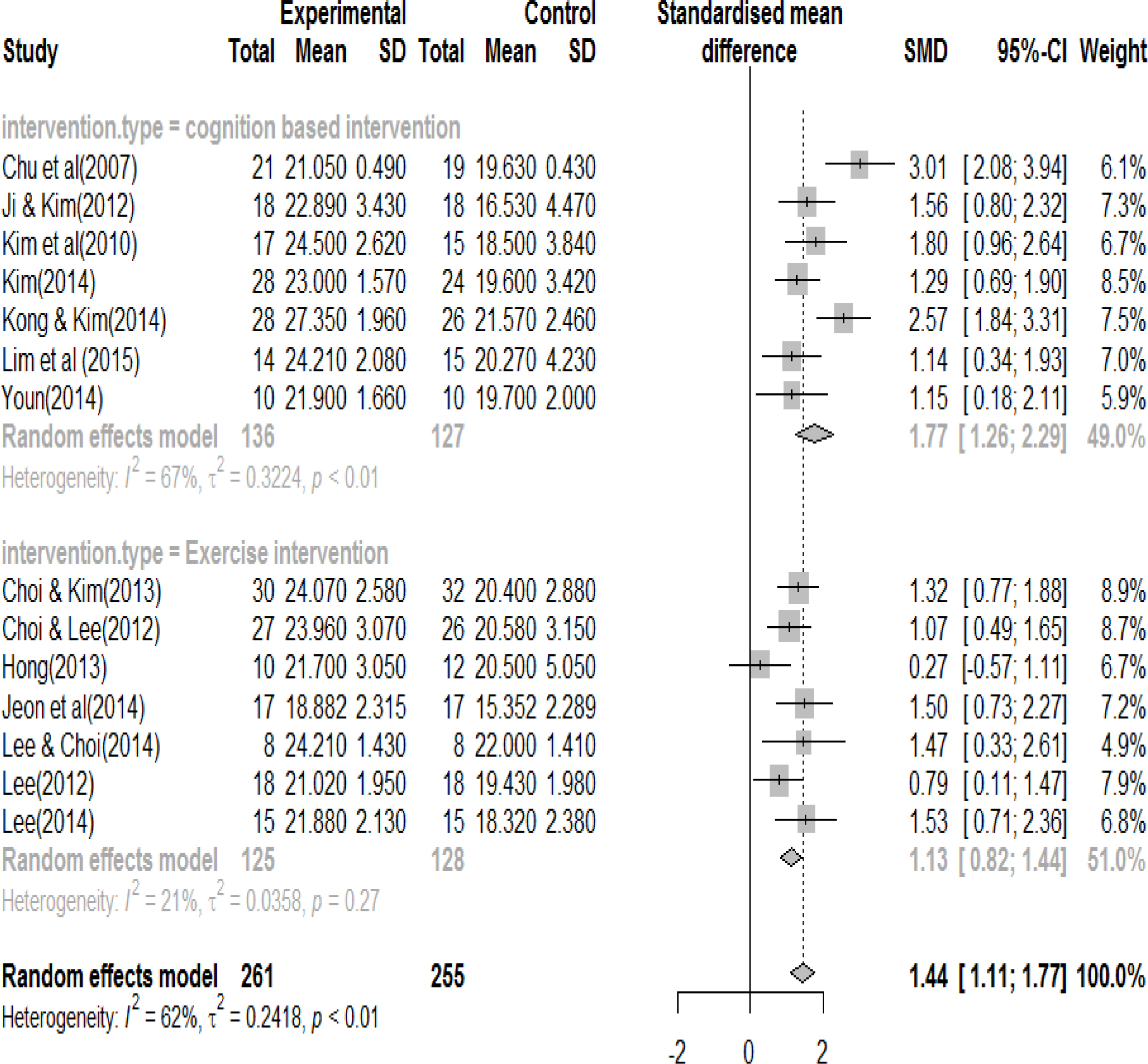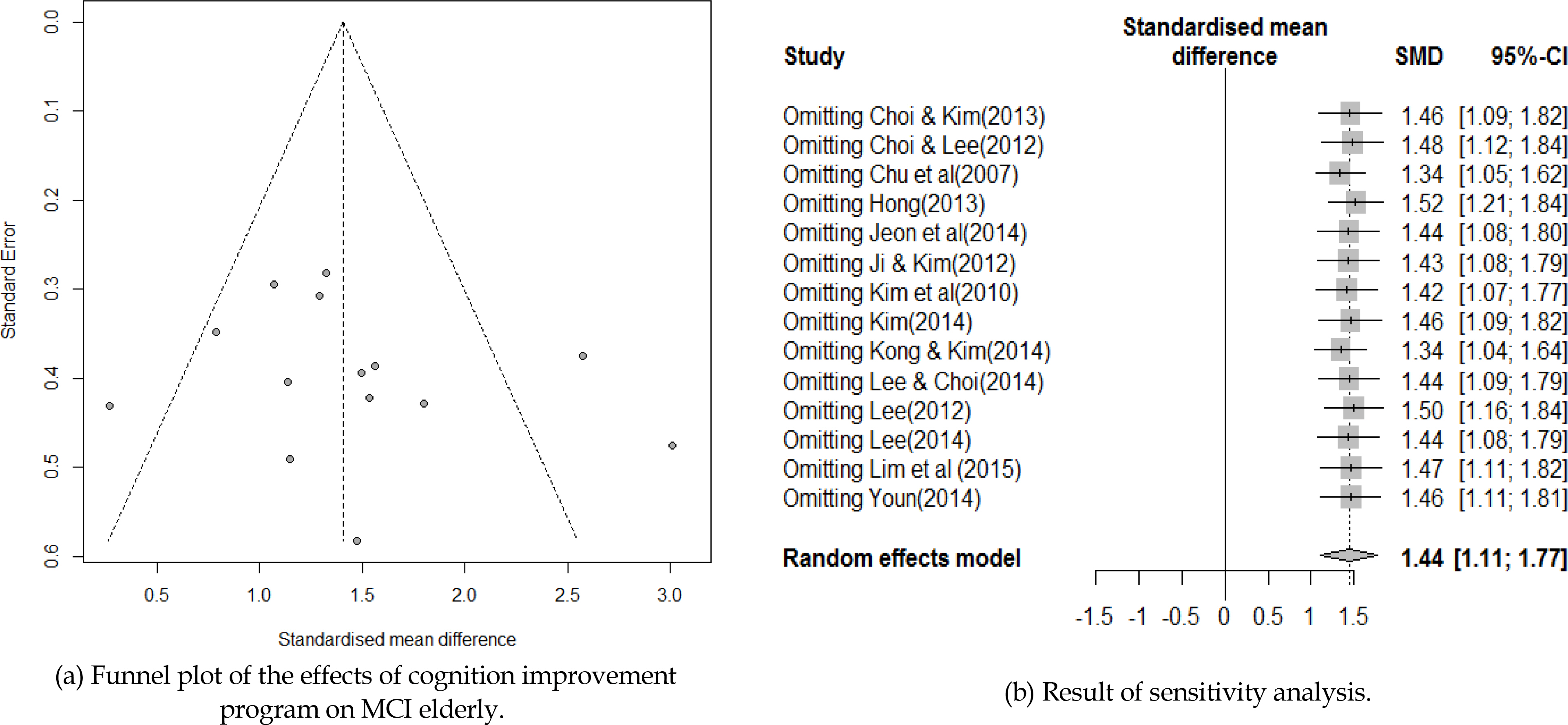Korean J Adult Nurs.
2017 Apr;29(2):177-189. 10.7475/kjan.2017.29.2.177.
Effect of Cognitive Improvement Programs for Mild Cognitive Impairment in Korean Elderly: A Meta-Analysis
- Affiliations
-
- 1College of Nursing, Kyungpook National University, Daegu, Korea.
- 2College of Nursing, Reserch Institute of Nursing Science, Kyungpook National University, Daegu, Korea. jewelee@knu.ac.kr
- KMID: 2378871
- DOI: http://doi.org/10.7475/kjan.2017.29.2.177
Abstract
- PURPOSE
A meta-analysis was conducted to identify the effect of cognitive improvement programs for the elderly with mild cognitive impairment (MCI) in Korea.
METHODS
Five databases, as well as relevant reference lists, of studies published from 2000 to 2016, were searched. Fourteen studies were identified. Quality assessments of included studies were conducted using the Scottish Intercollegiate Guidelines Network checklist. An R program was used to analyze effect sizes and to identify possible sources of heterogeneity among studies. The potential for publication bias was investigated using a funnel plot, Egger's regression test and sensitivity analysis.
RESULTS
The total effect size was large (Standardized Mean Difference [SMD]=1.44, 95% CI: 1.11~1.77), with cognition based intervention (SMD= 1.77, 95% CI: 1.26~2.29) and exercise intervention (SMD=1.13, 95% CI: 0.82~1.44). Statistically significant moderators were identified intervention type by meta-ANOVA analyses. Finally, no significant evidence of publication bias was found.
CONCLUSION
There is clear evidence that cognitive improvement programs can greatly enhance cognition in elderly with MCI. Future research should examine the effects of non-pharmacological interventions targeting elderly populations with mild-to-severe cognitive impairment in order to develop and enhance the effectiveness of cognitive improvement programs in Korea.
MeSH Terms
Figure
Reference
-
1. Statistics Korea. 2015 elderly statistics [Intenet]. Seoul: Statistics Korea;2015. [cited 2015 september 24]. Available from:. http://kostat.go.kr/portal/korea/kor_nw/2/1/index.board?bm ode=read&aSeq=348565.2. Ministry of Health & Welfare. National dementia strategy 2013-2015 [Internet]. Seoul: Ministry of Health & Welfare;2012. [cited 2012 July 27]. Available from:. http://www.silverweb.or.kr/_data/board_list_file/1/2012/1207301339541.pdf.3. McKhann GM, Knopman DS, Chertkow H, Hyman BT, Jack CR, Kawas CH, et al. The diagnosis of dementia due to Alzheimer's disease: recommendations from the National Institute on Aging-Alzheimer's Association workgroups on diagnostic guidelines for Alzheimer's disease. Alzheimer's & Dementia: The Journal of the Alzheimer's Association. 2011; 7(3):263–9. https://doi.org/10.1016/j.jalz.2011.03.005.
Article4. Hahn SJ, Paik NJ. Pharmacological treatment of dementia. Brain & Neurorehabilitation. 2015; 8(1):19–23. https://doi.org/10.12786/bn.2015.8.1.19.
Article5. Jorm AF, Dear KB, Burgess NM. Projections of future numbers of dementia cases in Australia with and without prevention. The Australian and New Zealand Journal of Psychiatry. 2005; 39(11-12):959–63. https://doi.org/10.1111/j.1440-1614.2005.01713.x.
Article6. Petersen RC, Doody R, Kurz A, Mohs RC, Morris JC, Rabins PV, et al. Current concepts in mild cognitive impairment. Archives of Neurology. 2001; 58(12):1985–92.
Article7. Kim WY, Han CH, Heo EJ, Kang HW, Jeon WK. A review of non-pharmacological intervention efficacy in patients with mild cognitive impairment. Journal of Oriental Neuropsy-chiatry. 2011; 22(3):1–11.
Article8. Rozzini L, Costardi D, Chilovi BV, Franzoni S, Trabucchi M, Padovani A. Efficacy of cognitive rehabilitation in patients with mild cognitive impairment treated with cholinesterase inhibitors. International Journal of Geriatric Psychiatry. 2007; 22(4):356–60. https://doi.org/10.1002/gps.1681.
Article9. Li H, Li J, Li N, Li B, Wang P, Zhou T. Cognitive intervention for persons with mild cognitive impairment: a meta-analysis. Ageing Research Reviews. 2011; 10(2):285–96. https://doi.org/10.1016/j.arr.2010.11.003.
Article10. Wang C, Yu JT, Wang HF, Tan CC, Meng XF, Tan L. Non-phar-macological interventions for patients with mild cognitive impairment: a meta-analysis of randomized controlled trials of cognition-based and exercise interventions. Journal of Alzheimer's Disease: JAD. 2014; 42(2):663–78. https://doi.org/10.3233/jad-140660.
Article11. Han JW, Seo JY, So YS, Kim KY, Ryu SH, Jeong HG, et al. Physical activity in individuals with dementia or mild cognitive impairment: a meta-analysis study. Alzheimer's & Dementia. 2014; 10(4):457.
Article12. Jeong PY, Sung JE, Sim HS. Meta-analysis of cognition-focused intervention for people with mild cognitive impairment and dementia. Communication Sciences & Disorders. 2014; 19(2):199–212. https://doi.org/10.12963/csd.14122.
Article13. Lee DY, Lee SJ, Kim YH, Kim JH, Kim HJ, Lee HJ. 2014 literature review for dementia prevention program development. Seoul: Seoul Dementia Center;2014. p. 1–51.14. Ministry of Health & Welfare. Clinical practice guideline for dementia part I: diagnosis & evaluation. Seoul: Clinical Research Center for Dementia;2009. p. 1–126.15. Organisation for Economic Cooperation and Development (OECD). OECD skills outlook 2013: First results from the survey of adult skills. Paris: OECD Publishing;2013. https://doi.org/10.1787/9789264204256-en.16. Higgins JPT, Green S. editors. Cochrane handbook for systematic reviews of interventions version 5.1.0 [Internet]. London, UK: The cochrane collaboration;2011. [cited 2011 March 20]. Available from:. http://handbook.cochrane.org/.17. Larzelere RE, Kuhn BR, Johnson B. The intervention selection bias: an underrecognized confound in intervention research. Psychological Bulletin. 2004; 130(2):289–303. https://doi.org/10.1037/0033-2909.130.2.289.
Article18. Littell JH, Corcoran J, Pillai V. Systematic reviews and meta- analysis. First ed. Jung IS, Jun SS, Hwang SK, Kim DH, Ha JY, translator. Seoul: Soomoonsa;2011.19. Scottish Intercollegiate Guidelines Network. SIGN 50: a guideline developer's handbook [Internet]. Edinburgh, UK: Author;2015. [cited 2015 November]. Available from:. http://www.sign.ac.uk.20. R package version 3.3.2 [Internet]. The comprehensive R archi-ve network;. 2016. [cited 2016 october 31]. Available from:. https://www.r-project.org/.21. Borenstein M, Hedges LV, Higgins JPT, Rothstein HR. Introduction to meta-analysis. West Sussex, UK:. John Wiley & Sons, Ltd;2009.22. Egger M, Smith GD, Schneider M, Minder C. Bias in meta-anal-ysis detected by a simple, graphical test. BMJ: British Medical Journal. 1997; 315(7109):629–34.
Article23. Cohen J. Statistical power analysis for the behavioral sciences. 2nd ed.Hillsdale, New Jersy: Lawrece Erlbaum Associates;1998.24. Hwang SD. Meta-analysis using R. Hakjisa. Seoul: Kim JH;2015.25. Kim HJ, Im HJ. Assessment of dementia. Brain & Neurorehabilitation. 2015; 8(1):11–8.
Article26. Herbison P, Hay-Smith J, Gillespie WJ. Adjustment of meta-analysis on the basis of quality score should be abandoned. Journal of Clinical Epidemiology. 2006; 59(12):1249–56.27. Juni P, Altman DG, Egger M. Assessing the quality of controlled clinical trials. British Medical Journal. 2001; 323(7303):42–6.28. Scher LS, Maynard RA, Stagner M. Interventions intended to reduce pregnancy related outcomes among teenagers. Camp-bell Systematic Reviews. 2006; 12.
- Full Text Links
- Actions
-
Cited
- CITED
-
- Close
- Share
- Similar articles
-
- Effects of Cognitive-based Interventions of Older Adults with Mild Cognitive Impairment: A Systematic Review and Meta-analysis
- Loneliness in Elderly Patients with Mild Cognitive Impairment: A Pilot Study
- The Clinical Significance of Cognitive Interventions for the Patients with Mild Cognitive Impairment
- The Effects of an Individual Cognitive Improvement Program on the Elderly with Mild Cognitive Impairments
- The Effect of Cognitive Stimulation Training on Elderly Persons with Dementia




